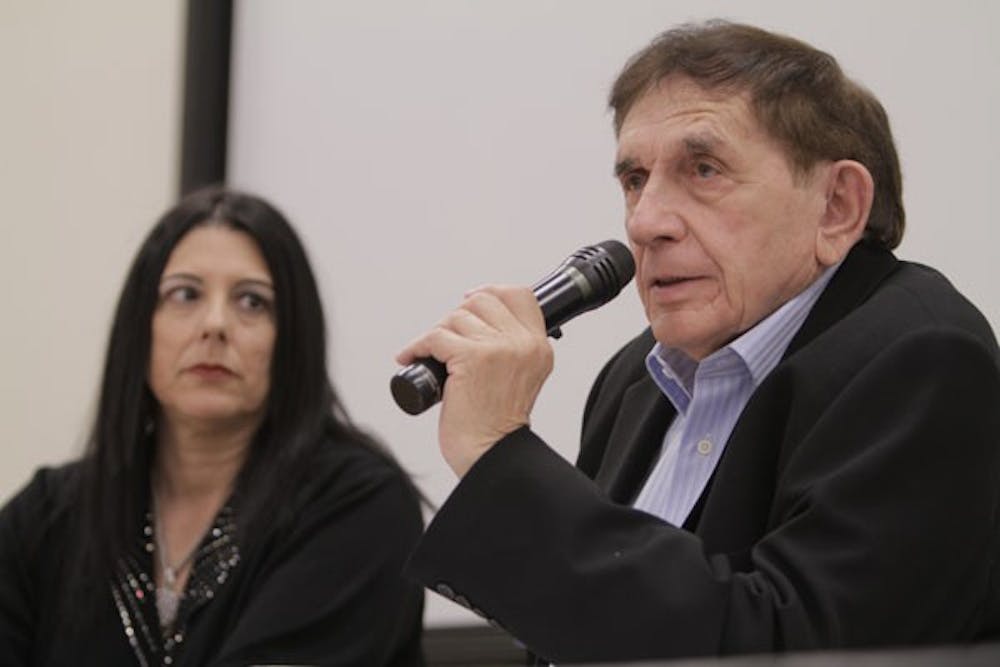 Though his story is a harrowing one, Bernard Scheer feels it is necessary for him to tell it to as many people possible. Here, the 85-year-old Holocaust survivor shares his experiences at the Osher Lifelong Learning Institute lecture while his daughter, Renay Leitman, looks on. (Photo by Sean Logan)
Though his story is a harrowing one, Bernard Scheer feels it is necessary for him to tell it to as many people possible. Here, the 85-year-old Holocaust survivor shares his experiences at the Osher Lifelong Learning Institute lecture while his daughter, Renay Leitman, looks on. (Photo by Sean Logan)Bernard Scheer, 85, said he felt compelled to describe the unbelievable to ensure it will never happen again.
Scheer shared his story of Holocaust survival, which he began telling 60 years ago, with approximately 50 people at ASU's Downtown campus Tuesday afternoon.
He said he viewed his presentations as a responsibility, not a choice, because there will soon come a time when no one is left to speak about the events.
“It’s my duty to talk about and speak out for the people,” he said. “I speak out for them and myself, so they know what happened once can never happen again … to any people.”
He said young people at the high school or university level will carry on the history of the Holocaust, and one of them will make the difference one day to ensure that the world will not forget the Holocaust.
“To forget is to give victory to the enemy,” Scheer said. “The world has forgotten too soon.”
Scheer acknowledges that a day will come when he can no longer share his story of the devastating events of the Holocaust and knows he is one of the final survivors left.
He said the second generation of survivors’ children and grandchildren will continue their legacy and encourage audiences to “listen and remember” the events of the Holocaust. Scheer’s daughter will keep speaking on behalf of her father.
Audience members included middle school and university students, senior citizens and church members brought by the Osher Lifelong Learning Institute.
Shirley Talley, OLLI coordinator at the Downtown campus, said the organization's goal is to give adults older than 50 an opportunity to learn. She said bringing the elderly students and ASU students together helps them realize a sense of community in the downtown Phoenix area.
"There are a lot of retirees that remember the Holocaust, remember what was going on," she said. "Maybe they were just children, but they remember."
Scheer was 13 and living in Poland in 1941 when Hitler’s army invaded his country and devastated his home and family. Nazi armies killed 12 of his family members, including his siblings and parents. Scheer escaped by hiding and then woke up in a concentration camp.
He weighed only 75 pounds when the U.S. Army liberated him from the camp in May 1945. Scheer boarded an American military ship with no papers or proof of his former life and left for New York City.
He said he was not welcomed in America as he had expected. People were not interested in his tears or story, he said.
“I don’t need tears, money or pity," Scheer said. "I needed attention. I was questioned by people, ‘Why are you still alive?’”
Scheer has since returned to his former hometown in Poland twice to touch the walls of his house, revisit the bunkers where he hid from the Nazis and pay respects to his father and 350 other former residents in the cemetery.
Scheer has written two books, “Don’t Cry Out Loud” and “Debt of the Innocent,” about his experience. He said that while his family hid from the Nazi army, his mother would tell him and his siblings that no one could hear them if they didn't cry.
“The Debt of the Innocent” refers to the 1.2 million children who were younger than 12 years old when they were killed.
“I can forgive the enemy for what they did to me personally, but I cannot forgive them for what they did to my father, my family and the innocent children," Scheer said. "I feel guilty for being a survivor, but that is why I am here today. … You who were not there will not understand."
Approximately two-thirds of Jews living in Europe before the war were killed in the Holocaust. At the end of WWII, more than 6 million European Jews were dead and only tens of thousands survived by hiding or endured as prisoners in concentration camps.
“My mission is to remember the past and educate the future in order to shape this world,” Scheer said. “I do not wish to forget anything.”
Reach the reporter at mrmill10@asu.edu or follow her on Twitter @mrmill10




